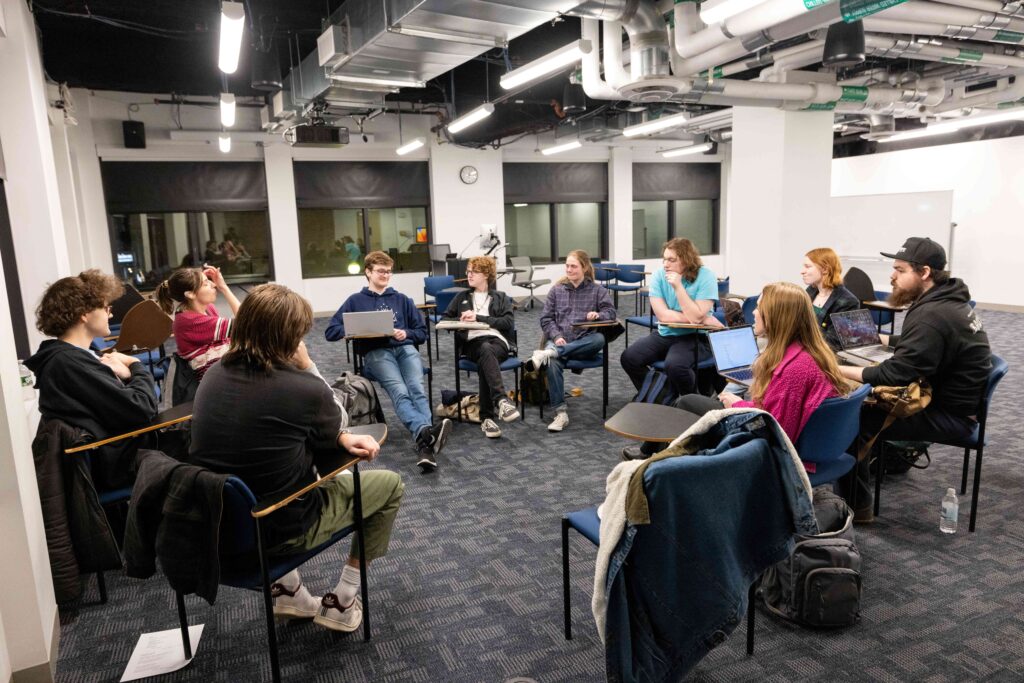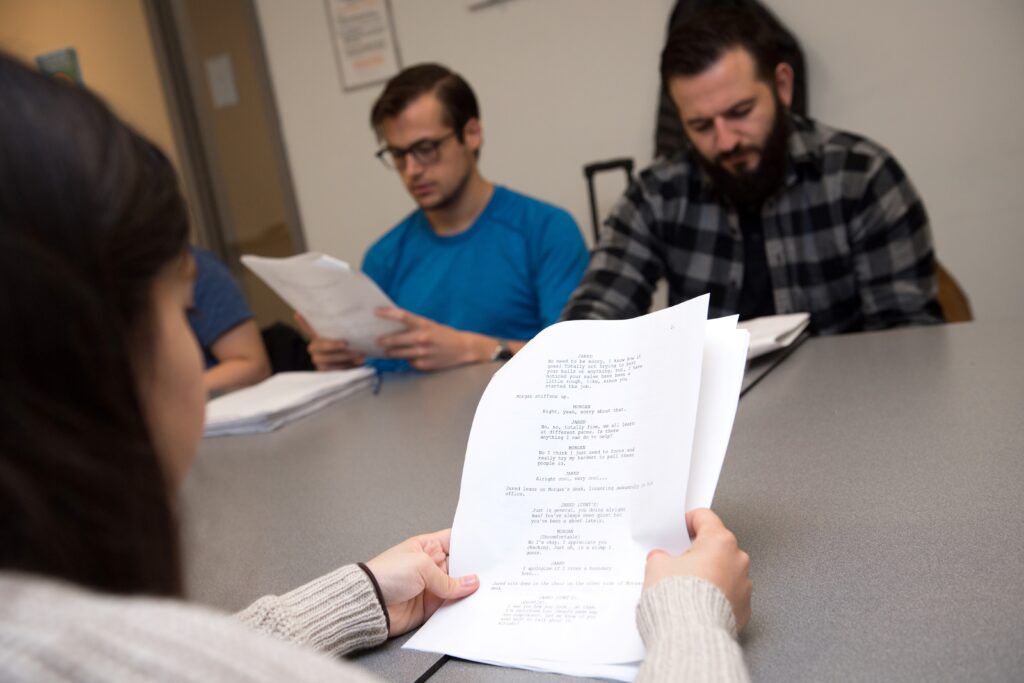When prospective students contemplate pursuing a Master of Fine Arts degree, or an MFA, they can be subjected to a myriad of outside opinions, many of them skeptical. Will this degree be worth the time and cost? Will it lead to a job? In this article, we break down the stigma behind pursuing an MFA.
We asked Kadin Smith, an MFA student in Emerson’s Writing for Film and Television program, and Barbara Selmo, Emerson’s Director of Graduate Admissions, to share their perspective on the greater value of an MFA. Kadin’s insight stems from being inside the classroom, while Barbara, once a poetry master’s student herself, approaches the topic from a broader lens of institutional knowledge. Their responses emphasize how an MFA is not a simple shortcut to guaranteed success, but an intentional investment in one’s creative life.
Why is there a stigma?

Kadin is no stranger to the skepticism surrounding creative degrees. “There’s a stigma that MFAs are useless or hold little value in the entertainment industry. Many people subscribe to the idea that success in this field is purely about connections—who you know, rather than what you know—and while networking is crucial, that mindset often diminishes the importance of formal education in the arts.”
He adds that the cultural devaluation of the arts often stems from a broader trend of anti-intellectualism and the need for instant gratification. “The expectation is to earn a bachelor’s degree, enter the workforce immediately, and secure a high-paying job. If a degree doesn’t lead to a lucrative career right away, it’s seen as worthless,” he says, adding that “education is often seen as a means to an end.”
He continues, “Curiosity, passion, and intellectual exploration have taken a backseat to financial outcomes. This shift has made creative degrees seem less ‘practical’ in the eyes of many, even though the demand for high-quality, original storytelling is stronger than ever. Storytelling, film, and television shape culture and society—investing in those skills through structured study is just as important as any other field.”
Barbara agrees. “These degrees are not the direct means to a financially-safe end, as Kadin so wisely said. They can be. Emerson graduates are eminently employable,” she says. “But these programs are also the pathway to the serious pursuit of craft, of connection, and a voice. The world, I would argue, is poorer without people passionately willing to study in these programs and then share with all of us.”
MFA as an Incubator

For Kadin, the MFA experience has been a personal and professional incubator. He cites the importance of his program’s workshop-style coursework, which has allowed him to explore different avenues such as short films, television, and feature writing. “In addition to writing, we take complementary courses that mirror our writing classes, such as genre theory or development,” he explains.
Due to the hands-on nature of the Writing for Film and Television program, Kadin says that even his approach to watching film and television has completely changed. “I’ve always been an avid viewer, but since starting the program, I’ve become much more analytical. I can now break down story structures, recognize plot devices, and anticipate narrative choices with greater precision. I view film and television as a contributor, rather than a consumer.”
Kadin also points to structured feedback, peer-to-peer engagement, and mentorship as essential parts of what an MFA can provide. “The ability to receive critical feedback, workshop ideas, and engage with peers in a professional capacity has been invaluable in my growth as a writer,” he remarks.
The Real Investment
As the Director of Graduate Admissions, Barbara builds and executes recruitment and enrollment strategies for Emerson’s graduate programs. As an MFA holder herself, she echoes that advanced degrees in the arts are deliberate investments. “An MFA is a person’s opportunity to be in practice for a specific and dedicated length of time,” she says. “For a practicing artist of any type, that is a gift, but also, a choice that comes with significant trade-offs.”
Those trade-offs—whether financial, personal, or professional—are real, and contribute to the stigma behind an MFA. “Any investment ‘comes with risk,’” she adds. “You are taking time away from other commitments–family, friends, community. But investments reap rewards. Give yourself to your MFA program and find that you will be paying yourself and your talent back with training, exposure, connection, and outcomes that could unfold immediately and over time.”
Barbara continues: “The investment of time for yourself, your art and its practice, and exposure and connection to a talented community such as you would find at Emerson, enhances your work, sharpens your skills, networks you with colleagues you will know for a lifetime, and launches you into creative circles wider than the solo practice of writing might.”
Kadin agrees with Barbara’s sentiments, acknowledging that it would be difficult to find spaces for structured collaboration opportunities outside of an academic setting. Because of this, he sees his investment in an MFA in Writing for Film and Television as threefold: “honing my voice as a writer, developing my screenwriting craft, and building a strong network.”
Structure with Flexibility
One of the distinguishing features of Emerson’s MFA programs is their structure—thoughtfully designed to support a wide range of student needs. In Kadin’s low-residency program, online learning is punctuated by immersive residencies that include masterclasses, table reads, and writing workshops.

Kadin says his residency in LA was a defining moment for him, particularly because he had the invaluable opportunity to work with Black-ish showrunner Courtney Lilly. “While there are many incredible Black creatives in Hollywood, I haven’t seen as many Black men in high-level writing and producing roles besides the giants such as Kenya Barris and Tyler Perry,” Kadin says. “Getting the chance to pitch to Courtney and learn from him was incredibly affirming—it reminded me that I have the potential to be a triple threat in this industry.”
Barbara emphasizes that this flexibility is intentional: “Our faculty carefully construct curricula that enhance knowledge and offer new information that connects with the realities of the profession itself, whether film writing, creative writing professorship, book editor, etc. This consideration, as well as the potential audience for the degree, can drive structure as well, such as online versus in person versus hybrid study.”
Beyond the Degree
Both Kadin and Barbara highlight that an MFA’s value isn’t limited to tangible outcomes like a finished manuscript or a polished pilot. It’s also about the intangibles.
“Looking back at my early work from the program—such as the pilot I submitted for my application or the five short scripts I wrote in my first semester—I can see tremendous growth. Before Emerson, I would jump into my screenwriting software with an idea, but without a clear plan; now, I approach writing with a more structured process that has elevated my storytelling,” Kadin says.
Barbara adds, “MFA programs give you community. They give you feedback, inspiration, courage; free lunches and exposure to amazing writers and artists. They give you the luxury of talking, doing and being with what you care about the most, with people who get what you are saying and feel similarly. A like minded community of individualists.” And perhaps most importantly, an MFA “gives you a breath and freedom to become more than yourself as an artist,” she emphasizes.

Final Thoughts: The Intangible Benefits of an MFA
Ultimately, the value of an MFA can’t be summed up by a salary or a job title. There may not be a linear pathway to follow, but that doesn’t mean a creative degree is any less impactful than one in business or STEM. For those like Kadin who are willing to take the risk, the rewards are vital to a successful career in the arts.
He finishes by saying, “For those who see value in craft, mentorship, and structured collaboration and are confident in making that investment, an MFA can provide the kind of guidance and community that’s difficult to find elsewhere.”


Leave a Reply